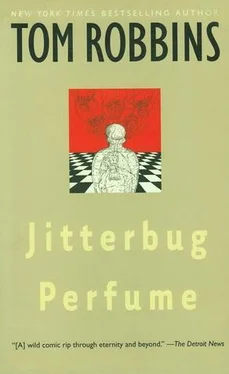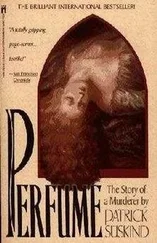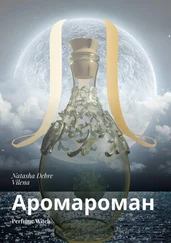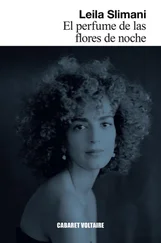“Inconceivable,” muttered Alobar.
“If Pan be alloweth to die, if belief in him totally decomposes, then the land, too, wilt die. It wilt be murdered by disrespect, just as Pan is murdered.”
Alobar looked around him. In every direction as far as he could see, fierce outcroppings of gray stone, green curves of pasture, uncompromising slopes, spiny shrubs and delicate poppies (unlikely partners in a fling ordered by a reckless breeze), mountains teeming with invisible springs, clouds lying like oatcakes upon the blue tablecloth of sky, all of this seemed so inviolable that he could not entertain the notion of its vulnerability, and he said as much to Lalo.
“Just the same,” the nymph answered, “shouldst thee continue to be successful in thy pursuit of long life, thou wilt see it transpire before thine eyes. Thus, I urge thee to protect Pan's dominions and reputations wherever thou mightst go. It be especially thy duty, not merely as a subject of Pan, but because thou, Alobar, art a prime practitioner of individualism, and it wilt be this new idea of individuality that leadeth many future men astray, causing them to feel superior to Pan, and thus to the land, which they wilt set upon to rape and spoil.”
A ripple of annoyance like the shock wave from a splat of buzzard guano, zigzagged along Alobar's forehead. “Nymph,” he said, puffing himself up like a pigeon, “I do not know if I enjoy you telling me what my duty is.”
“Alobar. .” Kudra's tone was meant to be conciliatory.
“Nor would I describe myself as a subject of Pan's. As for your attack on individualism. .”
“Good sir, I do not attack thy philosophy. I only warn that it be a dangerous instrument in the unfeeling hands of the foolish and corrupt.”
“Please inform me, then,” said Alobar sarcastically, holding his stuffy pose, “by what authority a cunt-of-the-woods issues warnings concerning the future. Among your more obvious talents—”
“Alobar!” This time, Kudra's voice was prickly with disapproval.
“—do you harbor the gift of prophecy?”
“Alas, I cannot make that claim for myself, sir, but ere I romped in Arkadia, I lived for years at Delphi, where I was intimate with the priests and priestesses who served the Oracle, and where I was privy to much oracular prognosis. Now I can sense that the boldness of my speech hast ruffled thy feathers, nevertheless thou must hear yet another prophetic plea. Certainly thou dost recollect Pan's words to the effect that mankind hast been too puny in his mind and heart and soul to deserve immortality. Yea? And certainly, also, to have conquered age to the extent that thou hast, thou must have done good strengthening work in thine own mind and heart and soul. Someday, however, a thousand years from today, there wilt be men who seek to defeat death by intelligence alone. They wilt combat age and death with potions and the like, medical weapons that their minds have invented, and age and death will shrink back from them and their medicines. Alas, because they fight with reason only, making no advance in the area of soul and heart, true immortality wilst be denied them. However, they must not be allowed to attain even the false immortality that their mental facility doth gain for them, for huge evil will be conducted if they shouldst. Thus, thou must vow upon this day that shouldst thou be living still when these events transpire, that thou willst battle them and refuseth prosperity to any immortalist thrust that doth not rise from man's soul and heart as well as his mind. Do promise me now.”
“I am sorry,” said Alobar, “but I cannot do that. Your intentions are good, so therefore I shall consider your request, but I do not make promises to just anyone about just anything.”
The nymph whirled, intent upon returning to the thickets, but Kudra detained her. “Lalo,” she called. “My husband claims, with some justification, to be king over himself, yet this morning he has momentarily lost sovereignty over his masculine pride. While he struggles to regain government over that portion of his kingdom, I wish to offer you my own promise, for what it is worth. It is presumptuous to imagine myself alive a thousand years hence, but should that miracle occur, I will do what I can to satisfy your plea. I promise.”
“Thank thee, my lady, I thank thee well. If Pan were aware of these matters, I am sure he wouldst express his gratitude at great length.” She winked at Kudra. Kudra winked back. For a second, the two women, the one statuesque and umber, the other petite and rosy, smiled at one another knowingly. Then, as quick as a rabbit (a rabbit with a touch of arthritis), Lalo shot into the bushes and was gone.
Alobar made to speak, but Kudra hushed him. “Look up there,” she whispered. High above them, barely visible upon the very pinnacle of the mountain, illuminated in the most resplendent manner by noonday sun, heel and horn almost silver, almost holy; stance jaunty yet solemn, regal yet a bit ridiculous; bearded head held at an angle suggestive both of an affection for the variety of life 'round about it and a suffering as primeval and sharp as the peak itself, stood Pan, reeds to lips, and though they scarcely could hear his tune, they felt it in the greasy stirring of the poppies and the mute breath of the snake that sunned itself on a nearby ledge. They watched him in silence for a while, inexplicable tears in their eyes; then Alobar, assisted, it seems, by sister Echo, yelled up the slope, “Lalo! Lalo! I promise, also! I promise! You have my word word ord ord.”
Kudra gave him a sloppy kiss. She took his hand. She clasped the teapot. Off they went, over the pastures, breathing in the circular Bandaloop way, locked in a silence finally broken by Kudra's laughter when Alobar lit up her other shoe.
If wild animals could talk, would they talk like cartoons? Would the dismal swamp resound with shrill, befuddled, childlike voices; a cute choir of cuddly Kermits delivering gentle froggy inanities?
Or would beasts converse in the style of Hemingway, in sentences short, brave, and clear; each word a smooth pebble damp with blood; aboriginal speech, he-man speech, an economy of language borrowed by Gary Cooper from frontiersmen who borrowed it from Apache and Ute?
We ask, “Did you see two people pass this way, a man and a woman, walking north?”
The stag shakes its antlers. “Nope,” he says.
“The woman was dark with a ripe body, the man had white in his hair. Sure you didn't spot them?”
“Yep.”
“Well, how about you?” we ask a fox. “Have you seen a couple in Byzantine garb heading in the direction of Bohemia?”
The fox is slow to speak. “Tonight I dined on loon at the pond,” he says. “It was a good meal. Food has an excellent place in my values. Quiet has an excellent place in my values. The forest has been quiet tonight. It is a good thing being a fox when the forest is quiet.”
“We apologize for disturbing your peace, but we're searching for a husband and wife, racially mixed, who may be in sort of a daze because they recently had an audience with Pan — you know what that means — and are either wandering aimlessly through the woodlands trying to figure out what to do next, or else are making their way by the stars to Bohemia, where the man at one time — longer ago than you might imagine — had an important job and a large family. They may have passed this way.” We pause hopefully.
“The hunt was good,” says the fox. “The moon was right. There was a fresh breeze. A man and a woman would have spooked the loon. What a good thing the forest is when it is left to the fox and the loon.”
Is that the way animals would talk?
As it turned out, Alobar and Kudra did pass through that forest, before or after the fox's dinner; did hike, guided by constellations, northward across Serbia, Croatia, and the Kingdom of Hungary, arriving in the summer of 1032 (or thereabouts) in that area where the feudal state of Bohemia bordered the Slavic territories. There was no trace of Alobar's former citadel. It had burned, like much of the ancient world, in the medieval furnace, its ashes swept under the rolling carpet of civilization. Compared to Western Europe, Bohemia and the Slavic territories were still wild and thinly populated, offering many a fox a place to linger over a bit of loon, like some remote animal ancestor of Ernest Hemingway, but even there in the Eastern backwash, the gold-dust twins, Christianity and Commerce, had set up their crooked wheel of fortune.
Читать дальше












